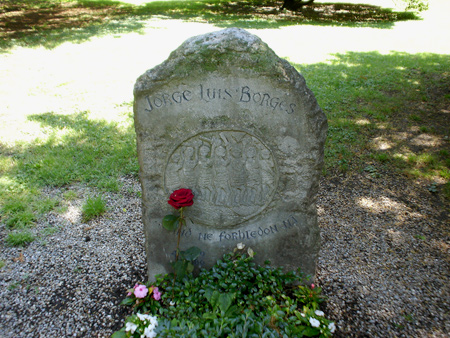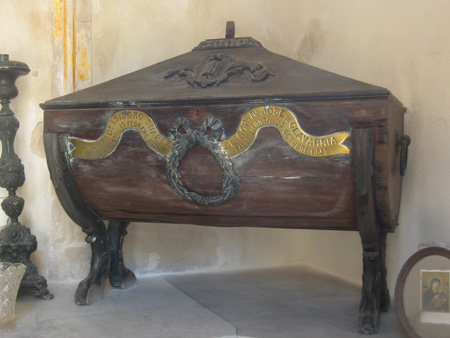As posted by Jeff on his blog, Borges may be moved before José de San Martín… we’ll have to wait & see.
The Peronist Party wants to repatriate their former political adversary Borges from Geneva to Recoleta by Ceferino Reato
A majority party representative, backed by the SADE (Sociedad Argentina de Escritores), will present a bill to repatriate the remains of Jorge Luis Borges which lie in Geneva since his death in 1986, following other notable Argentines like San Martín, Sarmiento, Rosas & Alberdi. The intention of the Peronists, of whom Borges said were neither good nor bad but incorrigible, is to finalize the transfer in August during festivities to celebrate his 110th birthday. “He is an Argentine icon,” posed one of his biographers. But his widow, María Kodama, could oppose the project.
Although certainly impossible, if he knew Jorge Luis Borges might comment: “Didn’t I tell you? Peronistas are neither good nor bad; they are incorrigible.” Old political adversaries of the great writer want to repatriate his remains, which have been in the Plainpalais local cemetery in Geneva for almost 23 years, to the family vault in Recoleta Cemetery.

By doing so, Borges will follow the path of other noted Argentines who died abroad & whose remains were returned to Argentina, such as José de San Martín, Domingo Faustino Sarmiento, Juan Manuel de Rosas & Juan Bautista Alberdi.
The intention of the majority party is to finalize the transfer in August for what would have been his 110th birthday.
The initiative comes from the pro-Kirchner Congressional representative for Buenos Aires, María Beatriz Lenz, who plans to present the bill at the end of February or the beginning of March with the backing of the Argentine Writers’ Society (SADE). Its President, Alejandro Vaccaro, is one of the most recognized biographers of the writer.
“Borges is an Argentine icon. Regardless if we are the kind of readers he desired or not; he already has a place in our heart. The repatriation of Borges’ remains is something that we owe ourselves & him as well,” explains Vaccaro in his Recoleta apartment which has been converted into a mini-museum dedicated to the writer.
For her part, Representative Lenz assures that the bill calling for repatriation of Borges’ remains already has the support of head of the House of Representatives Alberto Balestrin, the lower house’s Vice-President Patricia Vaca Narvaja, & the head of the Kirchner faction Agustín Rossi.
Borges & Peronism were always at odds; the writer never hid his fierce anti-Peronism & his lack of confidence in democracy (not about the nation) but wisely kept the topic to public declarations: “Politics will never interfere with my literary work,” he once said & experts agree with that, except for the short story “The Monster’s Party” written with Adolfo Bioy Casares & published in 1955 during a seminar in Uruguay.
In an Argentina deeply divided between Peronist supporters & opposers, Borges had his reasons: a few days after the first Presidency of Juan Perón began in 1946, he was “promoted” from his position in a public library to Chicken & Egg Inspector for local markets. Two years later his mother & sister, along with others, were detained by police in Florida Street for protesting against Perón & his wife, Eva. A judge later sentenced them with one month in prision.
Now, when that Argentina no longer exists, the Peronists—those “incorrigible people” as he defined them—want to bring him from Geneva where he died on June 14, 1986.
According to the large amount of documentation collected by Vaccaro, Borges often voiced his desire to be laid to rest in the family vault.
For example in his first book of poetry from 1923, Borges “writes about an absorbing afternoon when he wandered among the ‘sidewalks that eminate from lined-up pantheons’ & observed how ‘beautiful is the serene decision of tombs, their simple architecture & the small plazas as fresh as a patio.’ After that poetic description of Recoleta Cemetery, he praises: ‘[That entire afternoon, things] heard, read, meditated, I did it all in Recoleta Cemetery, alongside the very place where they must bury me.'”
“In the same sense many years later in his Personal Anthology, he clarifies, ‘I don’t pass by Recoleta Cemetery without remembering that buried there are my father, my grandparents, & my great, great grandparents, just like I will be.'”
In agreement with Vaccaro, Roberto Alifano—friend & collaborator of Borges for ever 10 years—affirmed that “in mulitple opportunities, not once or twice but several times, Borges expressed his desire that his remains lie together with his ancestors in the family vault of Recoleta Cemetery.”
The same had been said by the writer’s sister, Norah Borges de De Torre, on June 18, 1986. In a letter published in La Nación, Norah sustained that she had found out “by the press that my brother has died in Geneva, far from us & many friends,” & remembered that he “always wanted to be with his ancestors & mother in Recoleta Cemetery.”
The proponents of the repatriation of Borges’ remains have searched for all kinds of evidence because they foresee opposition from María Kodama, the second wife of the writer.
“All Argentines agree about this; only María Kodama could be against it. Why? For one, it is difficult to understand her point of view. For another, if Borges comes to Argentina, she would lose him since he would go to the vault of Borges’ nephews & nieces,” sustained Vaccaro who has maintained well-publicized disputes with Kodama.
At one time Kodama, who could not be located for this article, managed to block in Swiss court a request for the transfer of the writer’s remains to Argentina by his nephew, Miguel de Torre.
For this reason, Representative Lenz as well as the biographer Vaccaro claim that the only way to repatriate the remains of Borges is if the national government requires it by law. According to them, “the historic precedent most like this case is that of the poet Ricardo Güiraldes, who died in Paris in 1927. His remains were repatriated by means of a national law.”
“Furthermore the great-grandfather of Borges, Coronel Manuel Isidoro Suárez, was repatriated from Uruguay & his ashes lie in a wooden urn in the Borges vault, constructed for that occasion in 1879. [See below] Borges, always present in commemorative services, supported that action,” added Vaccaro:

———————————–
Original article in Spanish located here. The tombstone of Borges was photographed by Gonzalo Rosendo. All Argentines, as mentioned in the article, are probably not in agreement about the return of Borges, but it is odd that he isn’t in Recoleta Cemetery.
Update (25 Jan 2010): A few weeks after the iniciative was first presented, Congresswoman Lenz met with María Kodama & later withdrew her request to repatriate Borges. While living in Geneva, Borges & Kodama were constantly pursued by paparazzi… which inspired Borges to be buried there & not in his family plot. He did not want to bring the media circus of his death to Buenos Aires. After making his wishes known to Kodama, Borges wrote a letter in May 1986 to the Spanish news agency Efe denouncing harassment by the press. He also tried to clarify his reasons for leaving Argentina & marrying Kodama:
I’m a free man. I’ve decided to stay in Geneva because (my time there) corresponds to the happiest years of my life… My Buenos Aires continues to be that of the guitars, of the milongas, of the cisterns, of the patios. None of that exists anymore. It’s a big city like so many others. In Geneva I feel strangely happy. That has nothing to do with the reverence for my ancestors and with my essential love for my homeland. I find it strange that no one understands and respects the decision of a man who has taken—like a certain character of (H.G.) Wells—the decision to be an invisible man.
With the iniciative withdrawn & Lenz no longer a member of Congress after elections in June 2009, Borges safely rests in peace in Switzerland.
[lang_es]se sentía “misteriosamente feliz” en Ginebra, anunciaba su determinación de “ser un hombre invisible” en la ciudad y denunciaba el “asedio” al que era sometido por los periodistas.[/lang_es]
seria algo muy bueno la repatriacion de borges,potenciaria aun mas al cementerio,y su valor en el mundo seria unico ,felicitaciones con ustedes aprendo historia y mejoro mi ingles gracias friends